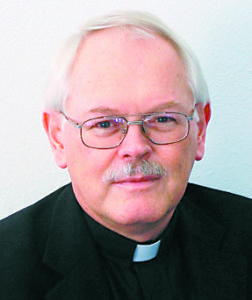
Father Ron Rolheiser, OMI
IN EXILE
By Father Ron Rolheiser, OMI
“Besides all this, between you and us a great chasm has been fixed, so that those who might want to pass from here to you cannot do so and no one can cross from there to us.”
Abraham speaks these words to a soul in hell in the famous parable of the Rich Man and Lazarus (Luke 16, 19-21) and they are generally understood to mean that there exists between heaven and hell a gap that’s impossible to bridge. Nobody passes from hell to heaven. Hell is forever and no amount of regret or repentance there will get you to heaven. Indeed, once in hell, nobody in heaven can help you either, the gap between the two is eternally fixed!
But that’s not what this parable is teaching.
Some years ago, Jean Vanier delivered the prestigious Massey Lectures and he took up this parable. The point he emphasized is that the “unbridgeable chasm” referred to here is not the gap between heaven and hell as this is understood in the popular mind. Rather, for Vanier, the unbridgeable gap exists already in this world in terms of the gap between the rich and the poor, a gap that we have forever been unable to bridge. Moreover it’s a gap with more dimensions than we first imagine.
What separates the rich from the poor so definitively with a chasm that, seemingly, can never be bridged? What would bridge that gap?
The prophet Isaiah offers us a helpful image here (Isaiah 65, 25). Drawing upon a messianic dream he tells us how that gap will finally be bridged. It will be bridged, he submits, in the Messianic age, when we’re in heaven because it’s there, in an age when God’s grace is finally able to affect universal reconciliation, that the “the wolf and lamb will feed together” (or, as this is commonly read, “the lion and the lamb will lie down together.”)
The lion and the lamb will lie down together. But lions kill lambs! How can this change? Well, that’s the unbridgeable gap between heaven and hell. That’s the gap between the victim and the killer, the powerless and the powerful, the bullied and the bully, the despised and the bigot, the oppressed and the oppressor, the victim and the racist, the hated and the hater, the older brother and his prodigal brother, the poor and the rich. That’s the gap between heaven and hell.
If this is what Isaiah intuits and I think it is, then this image contains a powerful challenge which goes both ways: It isn’t just the lion that needs to convert and become sensitive, understanding and non-violent enough to lie down with the lamb; the lamb too needs to convert and move to deeper levels of understanding, forgiveness and trust in order to lie down with the lion. Ironically, this may be a bigger challenge to the lamb than to the lion. Once wounded, once victimized, once hated, once spit on, once raped, once beaten-up by a bully, once discriminated against because of gender, race, religion or sexual orientation and it becomes very difficult, almost impossible existentially, to truly forgive, forget and move with trust towards the one who hurt us.
This is a tough saying, but life can be grossly unfair sometimes and perhaps the greatest unfairness of all is not the injustice of being victimized, violated, raped or murdered, but that, after all this has been done to us, we’re expected to forgive the one who did it to us while at the same time knowing that the one who hurt us probably has an easier time of it in terms of letting go of the incident and moving towards reconciliation. That’s perhaps the greatest unfairness of all. The lamb has to forgive the lion who killed it.
And yet this is the invitation to all of us who have ever been victimized. Parker Palmer suggests that violence is what happens when someone doesn’t know what else to do with his or her suffering and that domestic abuse, racism, sexism, homophobia and contempt for the poor are all cruel outcomes of this. What we need, he suggests, is a bigger “moral imagination”.
He’s right, I believe, on both scores: violence is what happens when people don’t know what to do with their sufferings and we do need a bigger moral imagination. But understanding that our abuser is in deep pain, that the bully himself was first bullied, doesn’t generally do much to ease our own pain and humiliation.
As well, imagining how ideally we should respond as Christians is helpful, but it doesn’t of itself give us the strength to forgive. Something else is needed, namely, a strength that’s presently beyond us.
This is a tough teaching, one that should not be glibly presented. How do you forgive someone who violated you? In this life, mostly, it’s impossible; but remember Isaiah is speaking about the messianic time, a time when, finally, with God’s help, we will be able to bridge that unbridgeable chasm.
(Oblate Father Ron Rolheiser, theologian, teacher and award-winning author, is President of the Oblate School of Theology in San Antonio, TX.)
